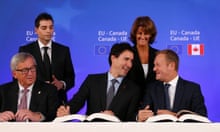The European Union has given Belgium’s federal government until late on Monday to secure backing for an EU-Canada trade deal from the region of Wallonia or a planned summit to sign the pact will be cancelled.
European Council president Donald Tusk, who chairs the collective body of the EU’s 28 national leaders, will speak to Belgian prime minister Charles Michel by late on Monday, an EU source told Reuters, so that Canadian prime minister Justin Trudeau can decide whether to fly to Brussels for the signing on Thursday.
If Michel cannot assure Tusk that Belgium will be able to let the EU sign the Ceta agreement, then Thursday’s EU-Canada summit will be postponed.
No new date will be set, although the source said neither the EU nor Canada was willing to give up on a free trade pact that has been years in the making.
But Paul Magnette, the leader of the Wallonia region, told the Belga news agency on Sunday that the ultimatum from the EU “is not compatible with the exercise of democratic rights”. Belgium’s federal government cannot agree to the deal without the consent of five regional authorities, including French-speaking Wallonia.
Magnette, a Socialist, says the deal is bad for Europe’s farmers and gives too much power to global corporate interests.
Magnette hit out at the EU, despite efforts by the bloc to provide reassurances to his government over investment protection – one of the major sticking points in negotiations between Brussels and Wallonia. One European diplomat said that the reassurances “responded to all of Mr Magnette’s concerns”.
Tusk was expected to call Michel on Monday, a source told Agence France-Presse, and ask “one simple question: will Belgium be in a position to sign the agreement on Thursday, yes or no?”.
Tusk will also call European Commission president, Jean-Claude Juncker, “to share an assessment of where we are,” and also Trudeau.
“Regarding Thursday, if Belgium is not in a position to say that they guarantee they can sign, it’s very clear for Tusk that it doesn’t make sense to have a summit, and there will be no summit, and there will be no date set for a new summit,” the source said. Any decision would be made jointly by Tusk and Trudeau.
Chrystia Freeland, Canada’s trade minister, flew home from Brussels on Saturday saying the ball was in the EU’s court after talks on Friday failed to overcome the differences.
The CETA – or comprehensive economic and trade agreement – would link the EU market of 500 million people with the world’s tenth biggest economy.
The deal is opposed by anti-globalisation groups who say it is a test model to push through an even more controversial EU-US trade agreement called TTIP, talks on which have also stalled.
Sebastian Dullien, a senior policy fellow at the European Council on Foreign Relations, criticised the commission for its role in the failure of negotiators to secure an agreement on the deal.
“The European Commission carries part of the blame because it didn’t quickly seek a dialogue with doubters. And for this type of deal, you need a large consensus,” he said.
Wallonia has some support for its position elsewhere in Europe.
On Saturday, 8,000 people including young people, farmers, union leaders and entrepreneurs joined a rally in Amsterdam in a show of solidarity, organisers said.
They held banners saying “Our world is not for sale” and “Stop these bad trade treaties”.
Wallonia has also enjoyed support from activist groups like Greenpeace which charged that the deal risked satisfying “corporate greed” and trampling on people’s rights and health standards on both sides of the Atlantic.
British prime minister Theresa May on Friday dismissed warnings that the EU-Canada deal raised serious questions about whether London could strike a similar agreement with the bloc after Brexit.
Reuters and Agence France-Presse contributed to this report.








